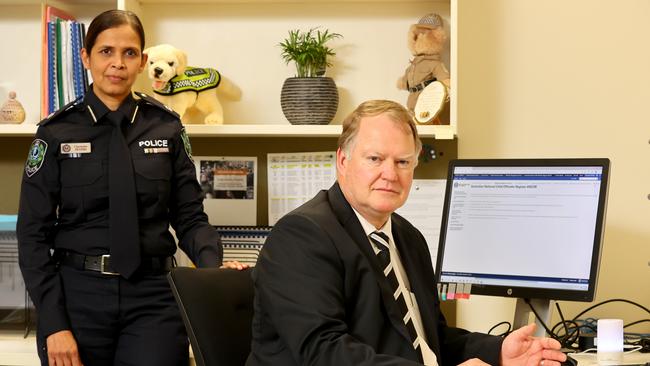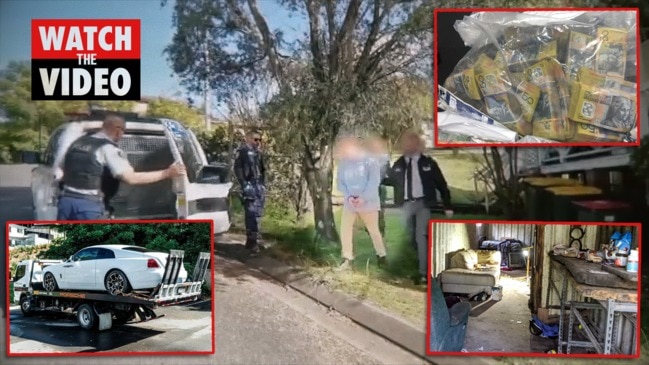2155 child sex offenders across SA now on the ANCOR paedophile register
The number of South Australians on the national paedophile register is rising each year – but police say there’s a good reason why it’s not publicly accessible.

True Crime
Don't miss out on the headlines from True Crime. Followed categories will be added to My News.
More than 2150 South Australians are now being constantly monitored by police after being convicted of child sex offences.
While 451 are still in prison, the remainder are living in communities across the state – including seven hardcore offenders who are subject to 24-hour GPS tracking to monitor their movements.
Police figures reveal there are 2155 convicted sex offenders in SA on the Australian National Child Sex Offender Registry – with the number rising annually as proactive policing detects more offenders.
In April 2017 there were 1959 individuals in the register – with 350 of them in custody.
The upward trend has prompted a warning from senior police to young adults to be aware their activity on social media could have “far-reaching consequences’’ for the remainder of their lives.

The officer-in-charge of SA Police’s Public Protection Branch, Detective Superintendent James Blandford, said the stereotypical view of a child sex offender was they were an older person, but that was now not the case.
“With the explosion of social media and access to the internet we are now seeing people across the age spectrum who are potentially at risk of being put on the child sex offender register because of what they do online or what they do with people through apps and other interactions,’’ he said.
“We make no secret this is a crime we take incredibly seriously. We have a robust and powerful partnership with Australian Federal Police to find and target offenders, identify children and save them from exploitation.
“The more we dig, the more we explore these linkages and sharing of child exploitation, the more offenders are going to be put before the court and held to account for their behaviour and that will increase the registry. It is a growth industry.’’
Legislation enabling the ANCOR to operate in SA was passed in 2007, prompting a major police operation to ensure all convicted child sex offenders in the state were registered.
There are several classes of offenders with some remaining on the register for eight years, others 15 years and more serious offenders for life.
Those on the register are subject to strict conditions such as bans on social media use, geographic travel restrictions and working or residing where children are present. They are also obliged to inform police if they change address or change their appearance in any way.
Breaches of the Child Sex Offenders Registration Act carry jail sentences of up to five years and a $25,000 fine.

Det-Supt Blandford said in 2020 there were 139 breaches, the majority for not adhering to reporting conditions under the Act, such as an individual changing their appearance or address without notification. Several breaches were serious, such as offenders working with or coming into direct contact with children.
“There are more people being checked, more searches are being done, so we are seeing an increase in detections for breaches,’’ he said.
“We are not babysitting child sex offenders, we are holding them to account. That is a consequence of what they do.’’
The ANCOR unit within the Public Protection Branch has 20 full-time officers who focus their activities on high-risk offenders, while police in metropolitan policing districts and country LSA’s monitor the low to medium-risk offenders assisted by ANCOR officers.
Under the Child Sex Offenders Registration Act, police have wide-ranging powers to conduct checks on registered offenders. Section 66 of the Act gives police more power than a general search warrant to enter an offenders’ home.
Unlike many registers in other countries, predominantly the United States, the register is not open to the public. Numerous studies have shown compliance with reporting conditions is increased in jurisdictions with closed registers.
“It is closed and it is closed for good reason,’’ Det-Supt Blandford said.
“You also don’t want people being targeted by vigilantes and taking a lot of police resources away from where they need to be.’’
Under the Act it is an offence for vigilantes to target individuals on the register, and so far there have been no incidents of this nature in SA.
Det-Supt Blandford said while there were hardcore recidivist paedophiles on the register, there were also young individuals who were on it because “they did stupid things and did not think about the consequences’’.
“They do not think, they just act through either self-interest, through selfishness or just a complete lack of respect,’’ he said.
“You run the risk of being put on the register for a very long time and it will seriously restrict you for many, many years of your life.’’
More Coverage
Originally published as 2155 child sex offenders across SA now on the ANCOR paedophile register




